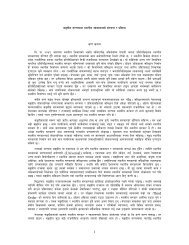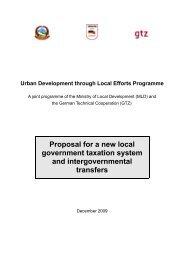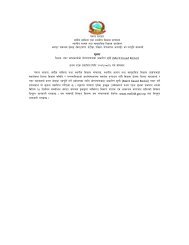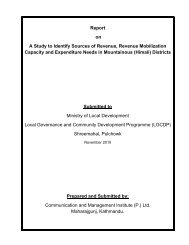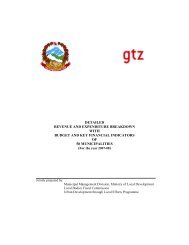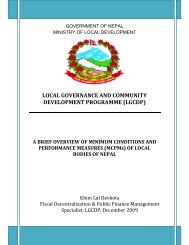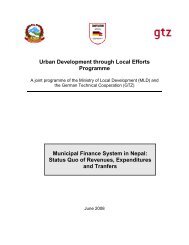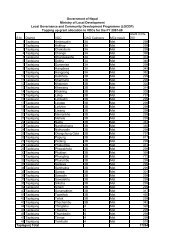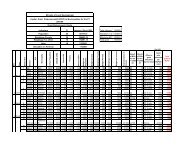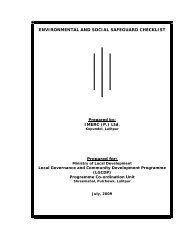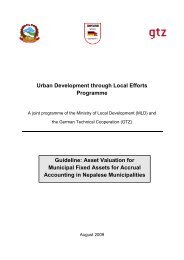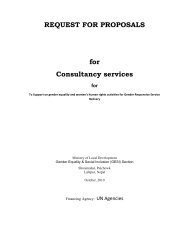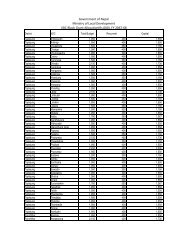GTZ Report on Accrual Accounting Status Quo - LGCDP
GTZ Report on Accrual Accounting Status Quo - LGCDP
GTZ Report on Accrual Accounting Status Quo - LGCDP
Create successful ePaper yourself
Turn your PDF publications into a flip-book with our unique Google optimized e-Paper software.
Cash <strong>Accounting</strong> vs. <strong>Accrual</strong> <strong>Accounting</strong> 10<br />
In order to reflect at least outstanding receivables (e.g. in tax management) and payables, the crucial linkage between<br />
the source and applicati<strong>on</strong> of funds, to create more transparency, accountability and resp<strong>on</strong>siveness according to cost<br />
centres (e.g. a bus park), some degree of accrual accounting seems necessary (Chu, 2008, p.9). The questi<strong>on</strong> is how<br />
extensive this accrual accounting approach has to be in order to be appropriate and efficient for the nati<strong>on</strong>al or subnati<strong>on</strong>al<br />
government level.<br />
At the nati<strong>on</strong>al level it is not a priority to implement a full fledged accrual accounting system since central government<br />
normally does not own many assets or at least does not have to rely <strong>on</strong> them as much as the sub nati<strong>on</strong>al level.<br />
Moreover nati<strong>on</strong>al government usually redistributes m<strong>on</strong>etary values and funds <strong>on</strong>ly. Therefore the first step of reform<br />
would be to improve the existing cash accounting system according to internati<strong>on</strong>al cash accounting standards for the<br />
public sector (e.g. the IPSASB Cash Standards) (IPSASB, 2008b; World Bank, 2007, p. 5). As a sec<strong>on</strong>d step of reform<br />
<strong>on</strong>e can focus <strong>on</strong> the implementati<strong>on</strong> of a modified accrual accounting system that dominantly focuses <strong>on</strong> revenues<br />
that are available to liquidate expenditures. In other words m<strong>on</strong>etary values and central government funds but with the<br />
important difference, compared to cash accounting, of knowing the c<strong>on</strong>necti<strong>on</strong> between the source and the applicati<strong>on</strong><br />
of these funds. Besides that, <strong>on</strong>e would also know receivables and payables. 1 As a result the central government<br />
would be able to evaluate the outcome of their funding as well as revenue and expenditure arrears. Of course that<br />
would also affect nati<strong>on</strong>al budgeting, reporting and auditing in the l<strong>on</strong>g run.<br />
At the municipal level a totally different picture appears since a municipality usually owns more capital assets (e.g.<br />
roads, bridges but also transport service providers and other infrastructure) and floating assets. In additi<strong>on</strong> it has to<br />
deal with resource c<strong>on</strong>sumpti<strong>on</strong>, reserve allocati<strong>on</strong>, critical debt levels etc. and the allocati<strong>on</strong> of usually scare<br />
resources in general. Therefore a sustainable asset and debt management is very crucial at a municipal level. In order<br />
to achieve these aims, a full accrual accounting system for the municipality including its public companies (e.g.<br />
transport providers and facilities) would be of major c<strong>on</strong>cern in the l<strong>on</strong>g run.<br />
However, in order to c<strong>on</strong>solidate accrual accounting implementati<strong>on</strong> a modified accrual accounting should be the first<br />
major step for municipalities towards full accrual accounting implementati<strong>on</strong> since it uses the same accounting<br />
framework and usually the same software. In developing countries it should be an opti<strong>on</strong> of choice if the municipalities<br />
start with a modified or full accrual accounting according to their current status and capacity. Both accrual accounting<br />
systems can enhance transparency by displaying what public goods have been produced with tax m<strong>on</strong>ey, e.g.<br />
Integrated Property Tax (IPT) in Nepal, or other taxes and fees.<br />
However, a full financial overview including asset management is <strong>on</strong>ly possible with a full fledged accrual accounting.<br />
The financial statements an accrual accounting can provide are an important basis to achieve credibility towards<br />
stakeholders like d<strong>on</strong>ors, banks, foreign investors, tax payers or the general public. Moreover, these informati<strong>on</strong> are<br />
useful for the management level of the municipality in order to improve the efficiency, effectiveness, feasibility,<br />
sustainability and quality of their investments and their financial management in more general terms.<br />
1<br />
In this regard, Nepal has already c<strong>on</strong>ducted a study <strong>on</strong> the improvements of the existing government accounting system under the technical<br />
support of ADB – the outcomes and suggesti<strong>on</strong>s are under discussi<strong>on</strong>.



